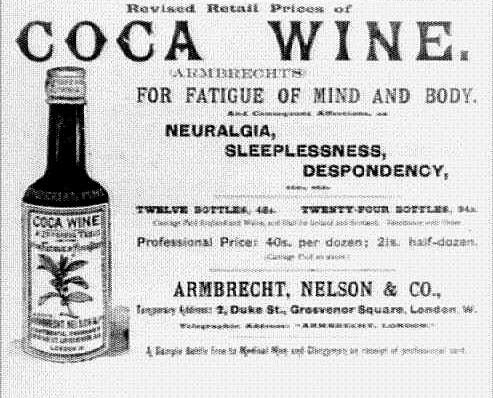Vintage Wine

According to the Sears, Roebuck and Co. Consumers' Guide (1900), their extraordinary Peruvian Wine of Coca...
"...sustains and refreshes both the body and brain....It may be taken at any time with perfect safety...it has been effectually proven that in the same space of time more than double the amount of work could be undergone when Peruvian Wine of Coca was used, and positively no fatigue experienced....."
Some 99% of contemporary Western users mix cocaine and ethyl alcohol. Cocaine and alcohol combine to form another hugely reinforcing compound, cocaethlyene. Coca-use only really took off in the West when it was blended with an alcoholic beverage.
The real soaraway success in Europe was Vin Mariani. Launched in 1863, it was an extremely palatable coca wine developed by the Corsican entrepreneur, Angelo Mariani. Mariani himself wrote a book eulogising coca; and he gathered artefacts of, and material on, the coca-loving Incas. At home, he collected coke-taking paraphernalia. He also took up amateur horticulture and cultivated the coca plant in his garden.
Coca wine made Mariani famous. Vin Mariani rapidly became the world's most popular prescription. Writers loved it. Anatole France, Henrik Ibsen, Jules Verne, Alexander Dumas, Sir Arthur Conan Doyle, Robert Louis Stephenson and numerous other literary luminaries could be counted among the roll of honour. Vin Mariani was celebrated by royalty as well: by Queen Victoria; King George 1 of Greece; King Alphonse X111 of Spain; the Shah of Persia; and by William McKinley, President of the United States.
A devotion to Vin Mariani transcended petty differences of religious dogma. The Grand Rabbi of France, Zadoc Kahn, was moved to write: "My conversion is complete. Praise be to Mariani's wine!" Pope Pius X was an enthusiast, as was Pope Leo X111. He gave coca wine an official seal of approval by awarding Angelo Mariani a special gold medal. In recent years, however, the Vatican has felt unable to renew its original endorsement.
John Pemberton, the Atlanta-born discoverer of Coca Cola, was a keen pharmacist and coca-lover. He based his original drink on Vin Mariani. 'Pemberton's French wine coca' proved singularly popular with US consumers. Coke was soon touted as 'an intellectual beverage'; though not on the basis of controlled clinical trials.
Atlanta introduced Prohibition in 1886. So Pemberton had to replace the wine in his recipe with sugar syrup. Thus 'Pemberton's French wine coca' became 'Coca-Cola: the temperance drink'.
Official approval of coca-based tonics began to wane towards the end of the century. Unfortunately, people prescribed cocaine to combat morphine dependence were becoming addicted to both.
In 1904, America's gathering moral panic about drug-abuse led the manufacturers to remove the cocaine from Coca-Cola. The US Government later tried to compel the company to drop the name 'Coca-Cola' too. After protracted legal argument, the name was saved; but traditionalists claimed the drink itself never quite recaptured its original glory.
|

